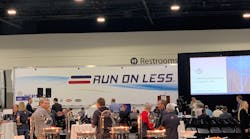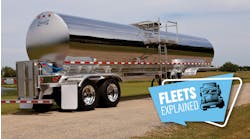ATLANTA - The 10 drivers and their tractor-trailers involved in the 2019 Run on Less Regional event achieved an average 8.3 miles per gallon, well above the national average of 6 mpg.
Mike Roeth, executive director of the North American Council on Freight Efficiency (NACFE), said this equates to $9 billion in fuel savings and 30.5 million fewer tons of carbon emissions if all fleets in the regional hauling space were performing at these levels.
Run on Less Regional kicked off on Oct. 7 from various points across the United States, culminating in Atlanta as the 2019 North American Commercial Vehicle (NACV) show was getting underway.
“Regional hauls ... are the quiet, modest part of this industry that doesn’t get enough attention,” Roeth said.
These are generally considered movements within a 300-mile range. The drivers generally stay close to home base and quite often are involved with low-speed, urban driving with multiple stops along the route.
The 10 participants in Run on Less Regional combined for 135 days of driving and 58,633 total miles, saving 2,750 gallons of fuel along the way. Average payload was 22,198 lbs., yielding 93 ton-miles per gallon.
The trucks involved in Run on Less all used commercially available aerodynamic equipment. The event helped to dispel the myth that these products “don’t work under 50 mph," Roeth said.
He added regional is also a rapidly growing segment and one that is ideal for alternative-fueled vehicles and battery-electric trucks.
The tractor-trailer from UPS Inc. was powered by compressed natural gas. It included the TruckWings gap closure device from XStream Trucking. TruckWings works by automatically deploying panels from the back of the cab to cover the tractor-trailer gap when a truck is at highway speeds.
Roeth said NACFE is planning to issue reports detailing additional findings from this year’s event early in 2020.
One area of particular interest may be payload. While long-haul drivers may have the same weight for days at a time, regional drivers have loads that drop or increase in weight throughout the day.
In 2017, the first Run on Less aimed at discovering what kind of fuel economy could be achieved by seven experienced drivers of Class 8 tractor-trailers. Using existing technologies and performing their usual duty cycles, the drivers totaled 99 days of driving and 50,000 miles. The result was an average of 10.1 mpg.
Here is a list of the 2019 professional drivers and the equipment used:
- Louis Scaruffi: 2019 Volvo VNR day cab with a Volvo D13 engine, driving for C&S Wholesale Grocers.
- Mark Casey: 2019 Freightliner Cascadia sleeper with Detroit DD15 engine, driving for Hirschbach.
- Glen Willams: 2020 International LT day cab with a Cummins X15 engine, driving for Hogan Transportation.
- Dustin Whitener: 2019 International LT sleeper with a Cummins X15 engine, driving for J.B. Hunt.
- Rita Bare: 2019 Freightliner Cascadia with a Detroit DD13 engine, driving for Meijer.
- Lou Martinez: 2019 Peterbilt 579 day cab with a Paccar MX-11 engine, driving for PepsiCo.
- Travis Lauer: 2018 Volvo VNR sleeper with a Volvo D11 engine, driving for Ploger Transportation.
- Michael Tam: 2019 Freightliner Cascadia sleeper with a Detroit DD15 engine, driving for Schneider.
- Beau White: 2019 Kenworth T680 day cab with a Cummins X15 engine, driving for Southeastern Freight Lines.
- Darin Salgado: A 2019 Kenworth T680 day cab with a Westport 12G engine, driving for UPS.
Editor’s note: Check back in November for commentary directly from Roeth about the results from the event.




